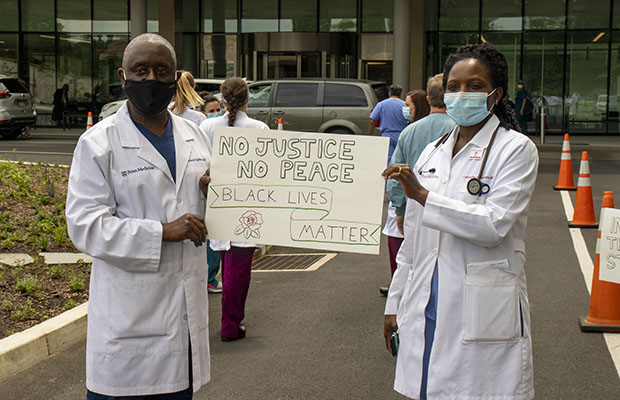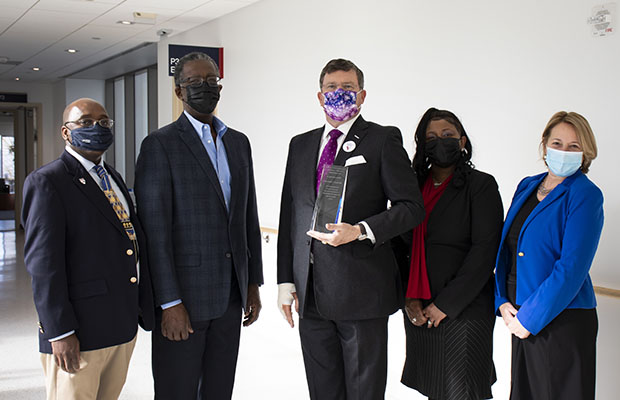
In partnership with community leaders, CEO Mike Duncan guides the hospital in taking the lessons of Black Lives Matter to heart.
Timmy Nelson of West Chester, PA, is a former UPS executive and the newest member of the Chester County Hospital Board of Directors, he is also a long-time member of the Patient and Family Advisory Council and the Turk’s Head Board, which advises the hospital on real estate matters. He also serves on the board of The United Way of Chester County.
As a black man in America, Nelson has been subject to racial profiling. There was the policeman who regularly patrolled his neighborhood and stopped his car outside Nelson's house, one day asking, "You live here?" He has been pulled over without cause and told it was part of a routine traffic stop. He has given his own children, especially his sons, "the talk" about how to interact with the police.
Such injustices have always been part of the lived experience for black Americans. Yet the nation could no longer look away on May, 25, 2020, when George Floyd was slowly suffocated to death in Minneapolis by a police offer. That same day, in Central Park, an individual called the police on a black birdwatcher who asked her to leash her dog. There have been numerous incidents since then which, thanks to bystanders' smartphones, have revealed unjust and inhumane actions targeting black Americans.
Chester County Hospital CEO Mike Duncan says the incidents of last May shook him to his core.
"My management philosophy is 'love people, expect excellence'. When Mr. Floyd was killed, I could tell our black front-line employees especially were deeply affected by it -- angry, fearful, traumatized. I didn't know what to do."
As many white CEOs issued statements supporting Black Lives Matter, Duncan was at a loss. What could a statement really do? This led to another question: As the leader of a hospital with many black employees and a duty to care for the community, what could he do to understand the situation and use it as an opportunity?
Start by Listening
Duncan called Timmy Nelson for advice and asked him to serve as his mentor. (Nelson notes he was "honored to play that role". He in turn connected Duncan with other black leaders in the West Chester community: educators, pastors, local NAACP Directors. One such leader was Pastor Kyle Boyer of Tabernacle Baptist Church in Coatesville, who is also a middle school teacher in Norristown, a Tredyffrin/ Easttown School Board member, and past president of the West Chester NAACP. Black leaders from the hospital's staff also made some introductions for Duncan. For example, Rhonda West-Haynes, MHA, BSN, RHIA, CCDS, CCS, CPC, Director of Revenue Operations, introduced him to Richard Roberts, III, founder and CEO of Young Men and Women in Charge in West Chester. This organization partners with area school districts to immerse low-income and minority K-12 students in a STEM-based curriculum, expose them to STEM professions and pave their way toward college.
These leaders became a kind of informal advisory group for Duncan -- people he could call for advice and counsel. "Initially I said the same thing to all of them: 'Tell me what my black employees need to hear from their white leader.'"
He went on to invite about 50 black staff members from across the hospital into his office for what he describes as "unfiltered" one-to-one discussions. "I asked them if they'd be willing to share their experiences with me, and how they were feeling as a result of the current events," Duncan explains.
What he heard really changed him. "Honestly, like many people, I thought we had made much more progress than we had," Duncan says.
Those listening sessions led to a series of first steps this fall and winter to root out any forms of systemic racism — no matter how subtle — at the hospital. In a way, this is a continuation of the work already started by the Diversity, Equity, and Inclusion Committee. An example of this initiative is the Legacy Builders Breakfast series for black women and men from throughout Chester County Hospital and Penn Medicine. But now the work is more intentional, more visible, and focused on raising everyone's awareness.
Taking the First Steps
Duncan asked an executive who had met one-on-one with him to consider sharing her story more widely. That led to small-group presentations with roughly 100 members of the management team. "Many said, 'I had no idea they were having this experience,'"” Duncan says.
He and his Executive Team appointed Timmy Nelson to the Board of Directors. The hospital will continue efforts to make sure that black voices are represented in senior-level positions. Pastor Kyle Boyer also presented a workshop on understanding white privilege to members of the Patient and Family Advisory Council, with plans to present to other groups in the future.
The hospital has also committed to mentoring black employees more proactively. An Environmental Services staff member who expressed interest in a clinical role is now working as an Emergency Department technician. A tech aide has moved to a new role as a sterilization processing tech.
"We want to help black employees grow into these roles and pull them forward," Duncan stresses.
Forging Community Partnerships
The hospital realizes it can't do this work alone, and the partnerships Duncan forged have led to productive collaborations. Physicians, nurses, and other staff members are volunteering with Young Men and Women in Charge (YMWIC) to educate young people about health and science careers. Some hospital staff served as judges for YMWIC's Annual Science Expo in March (held virtually). Others have made virtual presentations to students and their families on topics such as COVID-19 and mental health. Post-COVID, students will be able to come in for job shadowing.
On Martin Luther King Day, with Timmy Nelson's help, the hospital invited 10 members of St. Paul's Baptist Church to receive their COVID-19 vaccine and take part in a panel discussion with family medicine physician Dr. Lisa Croft, whose husband is the church's pastor. The event was recorded so it could be shared with the congregation and other black churches. Black Americans understandably have been reluctant to take vaccinations, given the history of medical experimentation on black populations. "The idea was, 'Here is something you can take back to your churches to try to move the needle for healthcare equity,'" Duncan says. Timmy Nelson is now inviting other churches and community groups to participate in similar COVID-19 vaccination events.
The hospital also prepared and recorded a Zoom event about the COVID-19 vaccine and presented it to the West Chester NAACP. Other area NAACP chapters were invited to attend the presentation and given the recording for future use. The hospital also shared it with area churches.
For Black History Month in February, the hospital hosted an online speaker series for its workforce featuring 12 influential voices in the black community. Among them was Pastor Kyle Boyer, who talked about the history of African-American progress in Chester County. Richard Roberts III of YMWIC spoke about his organization and brought in one of his senior scholars to share her experience.
"Mike Duncan seems to have this vision, which is very much aligned with our vision," Roberts says. "Societal change of this kind is not an overnight thing here. There is an old way of thinking that gets handed down from generation to generation. I am looking to have resources to be on the ground floor to begin to make change. And you have the Mike Duncans of the world who feel the same way."
"I am supportive of the hospital's commitment to equity," says Pastor Boyer. "People may not know the hospital well, but they expect it to be there when they are sick. But, underneath that terracotta roof is a leadership team committed to making the world a better place."
Looking to the Future

Duncan is adamant that these efforts will go on far beyond Martin Luther King Day and Black History Month. "A black pastor was in the hospital recently visiting some of her parishioners, and she told me, 'You have to keep this going and make sure it's not just a one-time event.' I agree, and we plan to keep making progress over time in various ways."
Still, the community is taking notice. Duncan was invited to talk about the hospital's efforts at a Penn Medicine forum as part of its Action for Cultural Transformation (ACT) initiative, focused on ensuring equity and eliminating racism. Black leaders at Chester County Hospital created a new award, the Spirit of Belonging Award, which they gave to Duncan during the hospital's service awards ceremony on January 14.
"I have never received an award that meant more to me," he said.
Mike continued, "We have five values here: Innovation, Collaboration, Accountability, Respect and Excellence. Respect is the most important. There is an expectation that everyone is going to be treated with respect. We have a lot to learn about how we are going to do that."
"Still, no matter what is going on in the world, when you get to campus, I want you to sigh and feel you are in a safe place," he added. "You have a voice and you are respected."
"There are several hospital employees at my church and many have told me they know I am working with Mike on diversity issues," Timmy Nelson adds. "And they say 'Thank you -- I think we are going to be better than we are now.' And that's really a driving force for me."